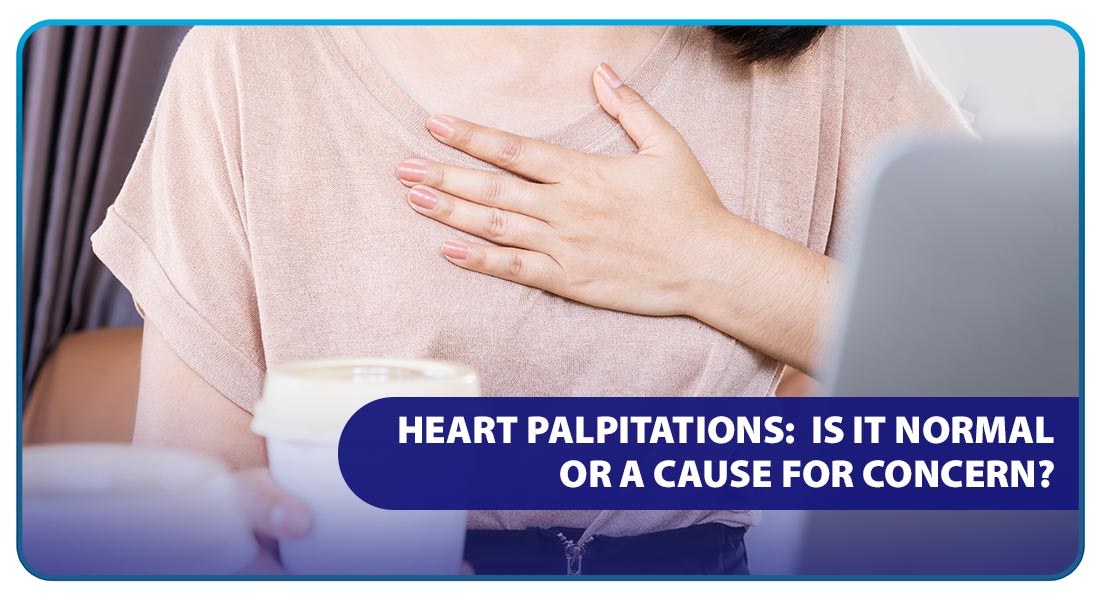A pounding or racing heart—known as a palpitation—can make you feel uneasy. The sensation, often described as a fluttering, pounding, or racing heartbeat, can be disconcerting, but is not commonly life-threatening. Here, we delve further into factors that trigger heart palpitations and the telltale signs on when you should see your doctor about it.
What happens when you palpitate?
Palpitation refers to the sensation of having a rapid or irregular heartbeat. This usually feels like your heart is pounding or racing. Some have also described palpitations as feeling like their heart skips a beat.
What causes palpitation?
Various factors can lead to an increased heart rate:
- Stress and anxiety are common triggers of palpitations, as part of our body’s response to stress is an increased heart rate.
- Caffeine intake may also influence heart rate for some as it is a known stimulant.
- Exercise, particularly ones that are strenuous, is also commonly known to elevate heart rate.
- Food sensitivity may also be one factor. Eating foods that are packed with carbohydrates, sugar, fat, or monosodium glutamate (MSG) may likewise trigger palpitations.
- On rare occasions, medical conditions may induce or result in palpitations. People with thyroid conditions, low blood sugar level, and heart problems like arrhythmia (irregular heart rhythm) may find themselves often experiencing palpitations.
When should I worry about palpitations?
Palpitations are generally nothing to worry about. But when you start to experience them more often and it involves chest pain or discomfort, shortness of breath, extreme dizziness, and fainting spells, it is best to have yourself checked by your doctor immediately.
How can I stop or avoid palpitations?
A pounding heart can feel uncomfortable, so it is understandable to want to get rid of this feeling fast. The first thing to do is to try to stay calm. Palpitations are often not a cause for concern and panicking may just make it worse.
Take deep breaths instead or try the box breathing method. This technique involves breathing in while counting to four, holding your breath for four seconds, slowly breathing out while counting to four again, holding your breath again for four seconds, and repeating the cycle.
Other ways to address palpitations is to start at the root cause. If your palpitation is not caused by a medical condition, try to identify your triggers and avoid their corresponding stimulants. Reduce your stress triggers and stay away from common stimulants like caffeine, alcohol, and nicotine.
Understanding and addressing the root causes of palpitations can empower you to make informed choices for a heart-healthy life.
General disclaimer
Your doctor will always be in the best position to give the appropriate medical advice for your condition. For suspected undesirable drug reaction, seek medical attention immediately and report to the FDA at www.fda.gov.ph and UNILAB, Inc. at 8-UNILAB-1 or productsafety@unilab.com.ph. Always buy your medicine from your trusted drugstores and retailers.
Sources:
- https://www.nhs.uk/conditions/heart-palpitations/
- https://www.webmd.com/heart-disease/atrial-fibrillation/ss/slideshow-heart-palpitations-causes
- https://www.mayoclinic.org/diseases-conditions/heart-palpitations/symptoms-causes/syc-20373196
- https://www.webmd.com/balance/what-is-box-breathing
- https://health.clevelandclinic.org/how-to-stop-palpitations





